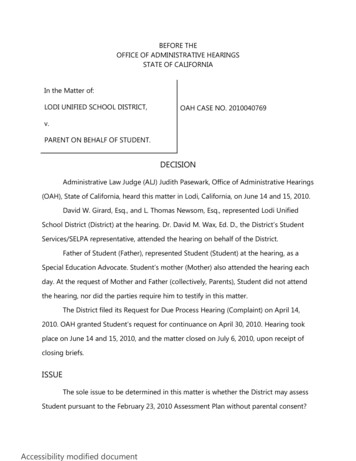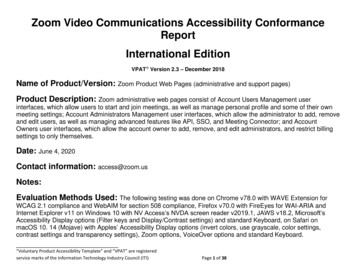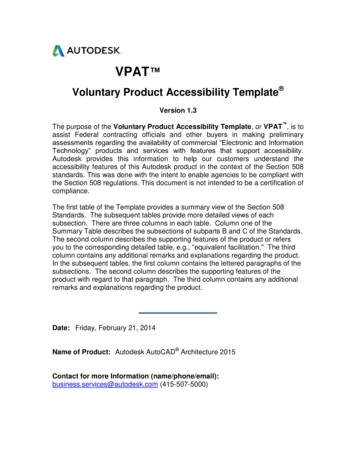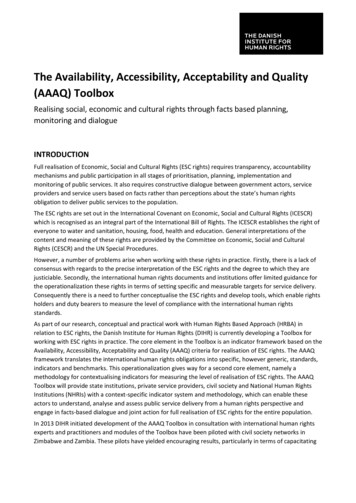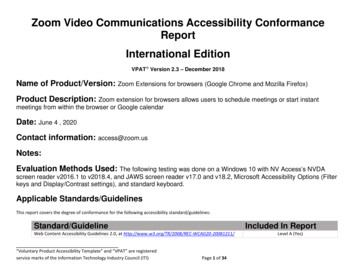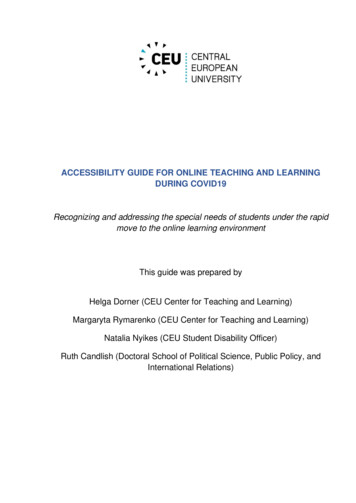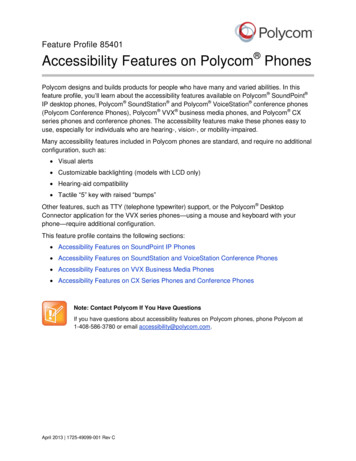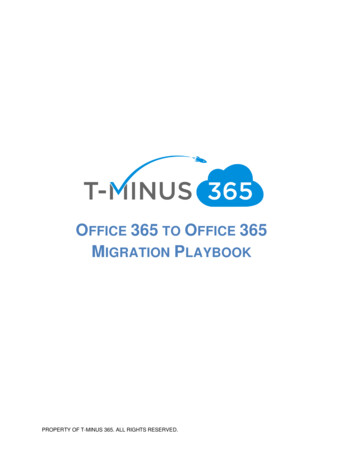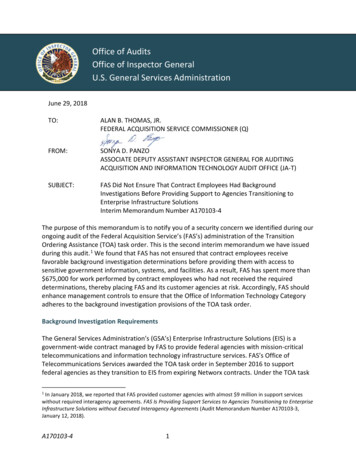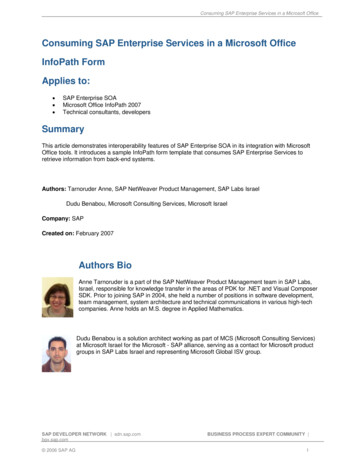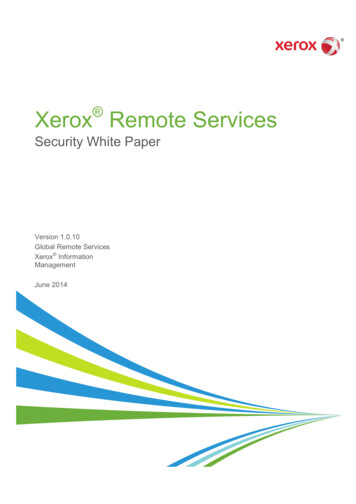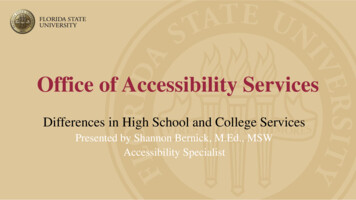
Transcription
Office of Accessibility ServicesDifferences in High School and College ServicesPresented by Shannon Bernick, M.Ed., MSWAccessibility Specialist
IDEA, ADA and Section 504High SchoolCollegeIndividuals with Disabilities Education Act IDEA is not applicable.(IDEA)Americans with Disabilities Act (ADA)Americans with Disabilities Act (ADA)Section 504 of the Rehabilitation ActSection 504 of the Rehabilitation ActAll children with a disability until theygraduate from high school or turn 22(whichever comes first)Everyone with a disability, provided they are“otherwise qualified” to attend schoolFocus on successFocus on access
Evaluation and DocumentationHigh SchoolCollegeSchool is legally responsible for theStudent self-identifies as a student withidentification of students with disabilities. disabilities to the Office of AccessibilityServices (OAS).School is legally responsible forevaluation of the student’s disabilities.Student must provide documentation of adisability from a licensed provider to theOAS. Evaluation for a disability is thestudent’s responsibility.
Determination of AccommodationsHigh SchoolCollegeAn Individualized Education Plan (IEP) or 504Plan is written by a Special Education Team.The student must apply for accommodationsthrough the OAS.The IEP or 504 Plan is implemented by theclassroom teacher, Special Education Teacherand support staff.The student and Accessibility Specialist engagein the interactive process to determine theappropriate accommodations.The student is responsible for requesting use oftheir approved accommodations in their classes.The student is responsible for discussing theimplementation of their accommodations withtheir instructors who will then implement themin the classroom.
Differences in AccommodationsHigh SchoolCollegeDetermined by IEP or 504 PlanDetermined through documentation andinteractive processModifications may be made to curriculum or Modifications that substantially impactcourse content.course objectives or program requirementsmay not be made.Individually designed instruction may beincluded in the IEP or 504 Plan.Reasonable accommodations are given toensure equal access.
Assistive Technology ProvisionsHigh SchoolCollegeThe school may provide personalizeddevices.The college provides assistivetechnologies related to classroom accessand participation.An example is a wheelchair for a studentwith mobility impairments.A textbook is converted to PDF format foruse with assistive software.
Classroom and Coursework ConsiderationsHigh SchoolCollegeAttendance is mandatory, and parent is responsiblefor ensuring student’s presence.Student is responsible for adhering to the attendancepolicies outlined in the course syllabus.School staff and parents structure the student’s time.Student manages their time.School staff and parents provide reminders forstudent regarding assignments and due dates.Student is responsible for planning and organizingassignments and ensuring due dates are met.Teachers and parents may approach students if theyperceive the student needs help.Student is responsible for reaching out for help ifneeded.Classroom instruction often re-teaches textbookcontent.Course instruction often expands upon textbookcontent.
Parent or Legal Guardian’s RoleHigh SchoolCollegeParent or legal guardian activelyparticipates in the identification andevaluation processes.Under the Family Educational Rights andPrivacy Act (FERPA), once a student isenrolled in a postsecondary institution, thestudent maintains their educational rights.Parent or legal guardian has access to thestudent’s educational records.The student must give their writtenconsent for their parent to access theirrecords.Parent or legal guardian advocates for thestudent.The student advocates for self.
FAQ: Do I have to disclose my diagnosis? No. However, if you choose not to disclose yourdiagnosis:– The college is not responsible for providingaccommodations.– You cannot file a grievance or claimdiscrimination.
FAQ: Can my request for accommodations bedenied? Yes.Your accommodation request can be denied in college if theaccommodation request is:– Personal in nature (e.g. personal care attendant)– Places an excessive financial or administrative burden on theinstitution– Changes the nature of the program or curriculum– Is not supported by documentation from a licensed provider
FAQ: Will I get the same accommodations I received incollege that I received in high school? Possibly.– Some accommodations remain the same fromhigh school to college (e.g. extended time onexams). Other accommodations are not providedon the college level (e.g. tutoring).– Documentation must directly link the student’sdiagnosis to the requested accommodation.
FAQ: Will I lose my accommodations if I do notuse them? No. However, if you choose not to use youraccommodations, you cannot:– apply them retroactively– file a grievance or claim discrimination
FAQ: Do I have to disclose my diagnosis to myprofessors? No. Your diagnosis is confidential information. The OAS will not disclose it to anyone outside ofour office, and you do not have to disclose it toanyone outside of our office either. You can disclose your diagnosis to yourprofessors if you would like, but it is not required.
Success Tips Submit your application and documentation andschedule an intake appointment as soon as possible. Make your accommodation requests at the start ofeach semester. Communicate early with your professors about youraccommodations. If there is a problem or you have a concern, ask forhelp as soon as possible.
Questions
OAS Contact InformationWebsite: https://dsst.fsu.edu/oasEmail: oas@fsu.eduPhone: 850-644-9566Shannon Bernicksbernick@fsu.edu
Presented by Shannon Bernick, M.Ed., MSW Accessibility Specialist. IDEA, ADA and Section 504 High School College . course objectives or program requirements may not be made. Individually designed instruction may be . sbernick@fsu.edu. Title: Office of Accessibility Services
